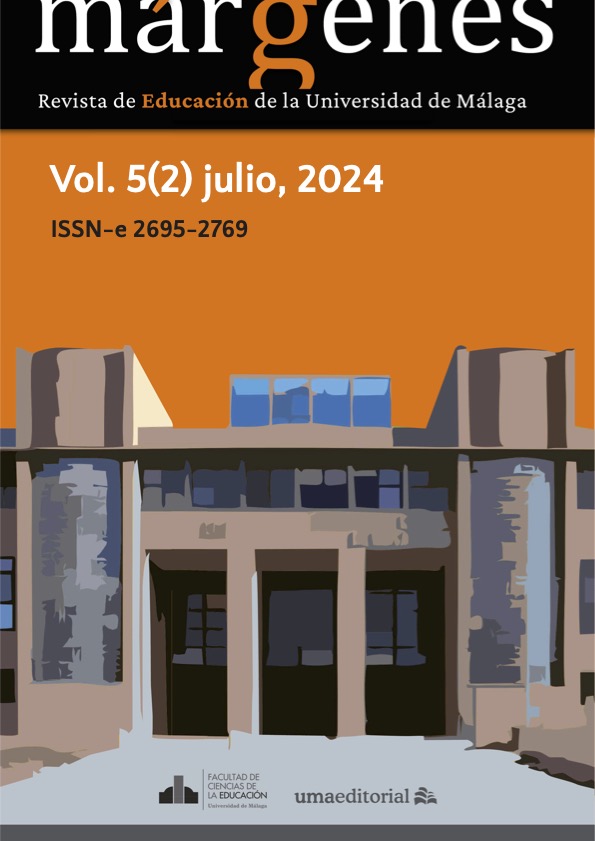Prepositions DO matter in the education research
DOI:
https://doi.org/10.24310/mar.5.2.2024.18113Keywords:
preposition, extractivism, reification, cognitive justiceAbstract
This minimal story is an invitation to think about prepositions, even though they are invariant words. The use of one or the other demarcates and determines not only the meaning of what is said, but also, and above all, the place it occupies in the relationship of dependence that defines between two or more parties. It is argued that its use and dominance is a political question. It analyzes the constructions "investigate to" and "investigate about", typical of extrativist, anti-democratic and dehumanizing research. Other constructions are claimed, such as "investigate with", "investigate together with" and "investigate for" to guarantee the cognitive justice that comes from fighting for the "unprecedentedly viable" (Freire, 1993).
Downloads
Metrics
References
Cheek, J. (2008). A Fine Line Positioning Qualitative Inquiry in the Wake of the Politics of Evidence. En N. K. Denzin, y M. D. Giardina (eds.), Qualitative Inquiry and the Politics of Evidence (pp. 119-133). Left Coast Press.
Denzin, N. K. (2009). The elephant in the living room: or extending the conversation about the politics of evidence. Qualitative Research, 9(2), 139–160. https://doi.org/10.1177/1468794108098034
Foucault, M. (2004). El orden del discurso. Fácula/Tusquets.
Freire, P. (1993). Pedagogía de la esperanza. Reencuentro con la pedagogía del oprimido. Siglo XXI.
Fricker, M. (2007). Epistemic injustice: Power and the ethics of knowing. Oxford.
Habermas, J. (1999). Teoría de la Acción Comunicativa. Racionalidad de la Acción y Racionalización Social (Vol.I). Taurus.
Larner, G. (2004). Family Therapy and the Politics of Evidence. Journal of Family Therapy, 26, 17–39. https://doi.org/10.1111/j.1467-6427.2004.00265.x
Medina, R. (2019). Aplicaciones metodológicas en feminismos y de(s)colonialidad. En AAVV, Otras formas de (des)aprender: investigación feminista en tiempos de violencia, resistencias y decolonialidad (pp. 111-128). Hegoa – SIMREF. https://bit.ly/47R3UC2
Nietzsche, F. (2000). Escritos sobre retórica. Trotta.
Platero, R. (L.) (2012). Introducción: La interseccionalidad como herramienta de estudio de la sexualidad. En R.(L.) Platero (ed.), Intersecciones: cuerpos y sexualidades en la encrucijada (pp. 15-72). Bellaterra.
Real Academia Española (2023). Diccionario de la Lengua Española. Edición del Tricentenario. https://dle.rae.es/
Santos, B. de S. (2021). Descolonizar la universidad. El desafío de la justicia cognitiva global. CLACSO.
Simpson, L., y Klein, N. (2017). Danzar el mundo para traerlo a la vida: conversación con Leanne Simpson de Idle No More. Tabula Rasa, (26), 51-70. http://dx.doi.org/10.25058/20112742.188
Torrance, H. (2018). Evidence, Criteria, Policy, and Politics: The Debate About Quality and Utility in Educational and Social Research. En N. K. Denzin, e Y. S. Lincoln (eds), The SAGE Handbook of Qualitative Research (pp. 1320- 1372). SAGE, 7th ed.
Vázquez Recio, R. (2023). A Deterritorialized Critical Pedagogy for Social and Cognitive Justice Towards an Itinerant Curriculum Theory: An Outlook from Spain. En J. C. Jupp (ed.), Itinerant Curriculum Theory: Decolonial Praxes, Theories, and Histories (pp. 315-352). Peter Lang.
Downloads
Published
How to Cite
Issue
Section
License
Copyright (c) 2024 Márgenes Revista de Educación de la Universidad de Málaga

This work is licensed under a Creative Commons Attribution-NoDerivatives 4.0 International License.
The editorial team of Márgenes supports an open Access policy of scientific knowledge. apostamos claramente por una política de acceso abierto del conocimiento científico (see Berlin Declaration).
Authors with work published in this journal accept the following conditions:
- This journal provides immediate free access to its content under the principle of making research freely available to the public. All contents published in Márgenes are subject to the Creative Commons Reconocimiento-SinObraDerivada 4.0 Internacional
It is the responsibility of the authors to obtain the necessary permissions of the images that are subject to copyright.
Authors whose contributions are accepted for publication in this journal will retain the non-exclusive right to use their contributions for academic, research and educational purposes, including self-archiving or deposit in open-access repositories of any kind.
The electronic edition of this magazine is edited by the Editorial of the University of Malaga (UmaEditorial), being necessary to cite the origin in any partial or total reproduction.
- Authors can enter into other additional independent contractual agreements for the non-exclusive distribution of the version of the article published in this journal (e.g. including it in an institutional repository or publishing it in a book) on the condition that they clearly indicate that the work was originally published in this journal.
- Authors are allowed and recommended to publish their work on the Internet (for example on institutional and personal websites), before and after the publication, as this could lead to constructive exchanges and a more extensive and quick circulation of published works (see The Effect of Open Access).














